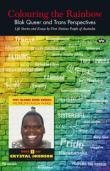 8194021192539013337.jpg
8194021192539013337.jpg
 Colouring the Rainbow : Blak Queer and Trans Perspectives : Life Stories and Essays by First Nations People of Australia
anthology
Colouring the Rainbow : Blak Queer and Trans Perspectives : Life Stories and Essays by First Nations People of Australia
anthology
 8194021192539013337.jpg
8194021192539013337.jpg
 Colouring the Rainbow : Blak Queer and Trans Perspectives : Life Stories and Essays by First Nations People of Australia
anthology
Colouring the Rainbow : Blak Queer and Trans Perspectives : Life Stories and Essays by First Nations People of Australia
anthology
'Twenty-two First Nations people reveal their inner reflections and outlooks on family and culture, identity and respect, homophobia, transphobia, racism and decolonisation, activism, art, performance and more, through life stories and essays. The contributors to this ground-breaking book not only record the continuing relevance of traditional culture and practices, they also explain the emergence of homonormativity within the context of contemporary settler colonialism. ...'
'One of the delights of working in the field of Gender Sexuality and Diversity Studies is that I sometimes get to review awesome books. Colouring the Rainbow: Blak Queer and Trans Perspectives. Life Stories and Essays by First Nations People of Australia is such a book. Through singular stories, oral histories, interviews and academic essays, this collection of work offers much needed perspectives of Blak Queer and Trans voices as they engage with how gender and sexuality intersect with Indigeneity and colonisation. The variety of the twenty-two contributors, the scope of issues and time-span covered, and reflections on the complicity between settler colonialism and homonormativity, all pave a much needed path for how we can begin to make sense of decolonising queer politics and “Queering Aboriginality” (8). There is no other collection like this, which enables non-Indigenous academics like myself an opportunity to read and learn how to open ways for decolonising both thought and politics in professional and personal contexts.' (Publication abstract)
'One of the delights of working in the field of Gender Sexuality and Diversity Studies is that I sometimes get to review awesome books. Colouring the Rainbow: Blak Queer and Trans Perspectives. Life Stories and Essays by First Nations People of Australia is such a book. Through singular stories, oral histories, interviews and academic essays, this collection of work offers much needed perspectives of Blak Queer and Trans voices as they engage with how gender and sexuality intersect with Indigeneity and colonisation. The variety of the twenty-two contributors, the scope of issues and time-span covered, and reflections on the complicity between settler colonialism and homonormativity, all pave a much needed path for how we can begin to make sense of decolonising queer politics and “Queering Aboriginality” (8). There is no other collection like this, which enables non-Indigenous academics like myself an opportunity to read and learn how to open ways for decolonising both thought and politics in professional and personal contexts.' (Publication abstract)